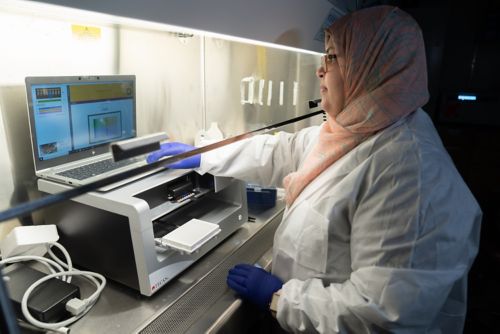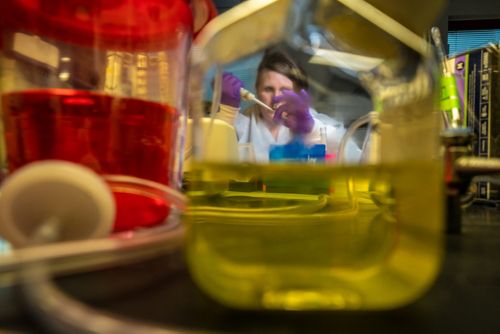St. Jude Family of Websites
Explore our cutting edge research, world-class patient care, career opportunities and more.
St. Jude Children's Research Hospital Home

- Fundraising
St. Jude Family of Websites
Explore our cutting edge research, world-class patient care, career opportunities and more.
St. Jude Children's Research Hospital Home

- Fundraising
Adam Durbin Lab
Targeting epigenomics and transcriptional regulation in pediatric solid tumors
About the Durbin Lab
Many pediatric solid tumors have poor survival rates because they cannot be targeted with available therapeutic agents. Our laboratory is developing new approaches to treat these tumors by deciphering the complex transcriptional circuits that drive their biology. These circuits play a role in cell fate determination and tumor heterogeneity. We use a combination of chemical modeling, epigenetic profiling, and CRISPR screening to interrogate their mechanisms. Our discoveries will improve therapeutic options for pediatric patients with intractable solid tumors.

Our research summary
Pediatric solid tumors present a formidable therapeutic challenge. This problem drives our work, including our particular interest in neuroblastoma, rhabdomyosarcoma, and osteosarcoma, among others. These solid tumors are characterized by specific molecular and (epi)genetic signatures, with only few targetable oncogenic mutations. Previous work in our laboratory and others revealed that there is a subgroup of transcription factors that control the transcriptional program and aggressive biology of individual solid tumor subtypes. This finding has important implications in regenerative medicine as well as how we understand tumor development and progression.
Since many of these transcription factors are not conventionally druggable, we are developing new methods to target them with novel therapeutics. We are leveraging the epigenome as a surrogate target and in doing so, have developed compounds that can selectively perturb subgroups of master transcriptional regulators. Both with colleagues at St. Jude and outside of the institution, we are using these compounds to pick apart transcriptional circuitries, identify the dominant regulators and their function, and explore how these compounds may ultimately be optimized for in vivo use.

In parallel, we are using next generation chemical modeling and CRISPR knock-in strategies to disrupt – in real time – these transcriptional circuitries that drive cell identity. Here we are focusing primarily on neuroblastoma and the immediate effects of targeting these circuitries on cell fate, transcriptional regulation, tumor heterogeneity, and three-dimensional genomics. We are developing a variety of tools and techniques to better understand how these transcription factors regulate cell state in several pediatric solid tumors, and how this can be perturbed for therapeutic benefit.
We collaborate extensively with investigators across the country on numerous research endeavors. These projects include developing cell lines and models for rare tumors, exploring the effect of bromodomain-specific inhibitors in neuroblastoma and other tumors, investigating chromatin accessibility in neuroblastoma and rhabdomyosarcoma, and participating in the COMET Initiative that fosters research and innovation across all pediatric solid tumors.
Selected publications
Contact us
Adam D. Durbin, MD, PhD
Molecular Oncology
MS 353, Room D5062F
St. Jude Children's Research Hospital
Follow us

Memphis, TN, 38105-3678 USA GET DIRECTIONS
